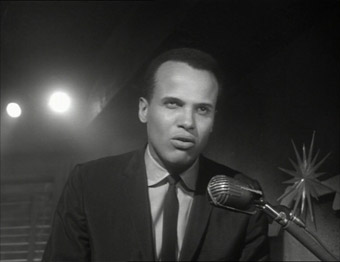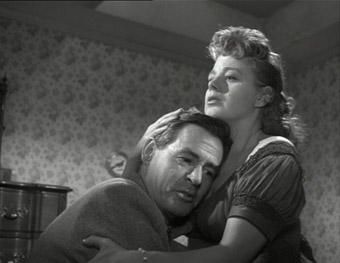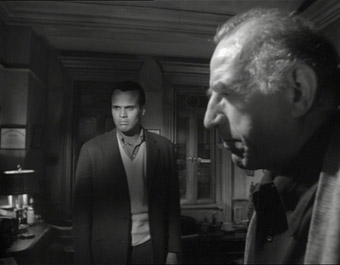|
What sounds like a familiar setup for a run-of-the-mill crime drama soon proves to be anything but. Down-on-his-luck ex-convict Earl Slater and debt-strapped musician Johnny Ingram are individually contacted by dumped-on former cop Dave Burke and invited to take part in a bank robbery that he's been planning. Neither man initially believes the risk is worth the proposed sizeable haul, but pressures in their respective private lives (and a little manipulation on the part of Dave, deliciously played by Ed Begley) eventually prompt both to jump on board. Earl and Johnny only glimpse each other in passing until the deal is done, but when Earl realises just who he's working with he tells Dave with undisguised loathing, "You didn't say nothin' about the third man being a nigger." Yep, in what you can be generously attributed to a staggering lack of foresight on Dave's part, he's teamed a proud black man with a bitter southern racist.
It may seem a somewhat unlikely premise, but it's most effectively sold here on the basis of Dave's specific needs, with his choice of partners being narrowed to those financially desperate enough to participate in the robbery and who are trustworthy enough to not blab about it to others should they choose to decline. Johnny's role in particular requires a black face in order to dupe a security guard who we can assume – in his own casually racist way – will look no further than the skin colour of the vendor who brings the bank staff their nightly coffee. If the noir seeds are sewn with Earl's statement of loathing, they well and truly take root with the extended peeks at Johnny and Earl's private lives. By the time we get to the robbery itself, anyone who expects it to go well for any of those involved is presumably new to this most distinctive genre of American crime thriller.

In typical noir manner, the characters are nowhere near as straightforward as first impressions or indeed the casting might suggest, particularly given that Johnny is played by a clean-cut Harry Belafonte and Earl by professional noir bad guy Robert Ryan. Johnny's nice guy surface is soon peeled back to reveal a compulsive gambler who's heavily in debt to dangerous loan shark Bacco, a state of affairs we can assume contributed to the break-up of his marriage. He still appears to be on friendly terms with wife Ruth when he drops round to take his young daughter out for the day, but her refusal to submit to his advances soon prompts his anger at both her and her integration into the white community to boil to over. Although he likes to play the ladies man, his heart's no longer in it, a backstage kiss with a female colleague provoking the response, "That's good...but it was better when you wanted it."
Earl, on the other hand, is far from the black-hearted monster it would be so easy to paint him as. He too is the victim of his own pride, his hair-trigger anger stemming largely from his inability to find work and his resulting financial reliance on girlfriend Lorry (Shelley Winters). Initially he appears devoted to her, but when his pride prompts a row that sends her scurrying, he's soon in the arms of lascivious neighbour Helen (Gloria Grahame at her most blatantly suggestive), who's turned on by the fact that he was once banged up for murder. Both men are given scenes of public humiliation to help steer them towards the dark side, Johnny when he gets drunk and makes a fool of himself on stage, Earl when he talks back to a soldier who is trying to impress a girl in a bar. This provokes a confrontation that almost demands the soldier get his comeuppance, but when it happens it provides neither Earl nor the audience with the expected cathartic satisfaction.
The characters are the film's driving force and are so well defined and so compellingly explored that they come close to sidelining the plot, but in a manner that in no way leaves you feeling short-changed. The robbery itself is saved for the final act, and the seeming inevitability of disaster does nothing to lessen the tension of the build-up. When things do go bad they do so with a speed, direction and conclusion that are likely to catch even the noir familiar a little on the hop.

Even if it weren't the fine film that it is, Odds Against Tomorrow would have earned its place in film history for the talent involved in its creation. Co-produced by Belafonte and directed by the great Robert Wise, it was splendidly adapted from The Big Heat writer William P. McGivern's novel by Nelson Gidding (who went on to pen screenplays for The Haunting and The Andromeda Strain, both of which were also directed by Wise) and the then blacklisted writer/director Abraham Polonsky (Body and Soul, Force of Evil). The striking cinematography by Joseph C. Brun (who six years later lensed the cult favourite Who Shot Teddy Bear?) is given an intermittently surreal edge by his one-off experiments with infra-red film, while editor Dede Allen (later to be thrice Oscar nominated for Dog Day Afternoon, Reds and Wonder Boys) keeps the action tight as a tornique and makes even scene transitions worthy of note. The icing on the cake is provided by jazz pianist John Lewis, who would later score Derek Jarman's The Tempest and who laces the soundtrack with a memorable blend of moody nightclub tunes and atmospherically doomy jazz instrumentals. A stellar cast are all on terrific form, with Belafonte as good as you'll ever see him and Ryan working wonders to bring a sympathetic edge to a character who on paper would seem to deserve none. Even the supporting roles are played to the hilt, particularly Will Kuluva's ruthless loan shark Bracca, one of those film characters who is almost as threatening as his real-life equivalent. And in his first credited feature role, future Godfather and Marathon Man hard guy Richard Bright certainly grabs attention as Bracca's camp henchman Coco.
Odds Against Tomorrow (even that title is laden with doom) is a cracking little film noir that, if the IMDb's trivia section is to be believed, was a key influence on Jean-Pierre Melville and was cited by crime writer James Ellroy as "just the best heist-gone-wrong movie ever made." While I'd argue that there are a few other genre works in serious competition for that particular accolade, the inclusion and handling of racial conflict here give this film a distinctive edge, and in all other respects is as stylish and hard-boiled as the best of them.
A clean monochrome 1.33:1 transfer with a nice tonal range and decent black levels. The image is just a touch shy of pin sharp and there are variances in the source material caused by Joseph Brun's infra-red experiments that could be mistaken for print or transfer issues, but the shots in question look authentic to the process used.

A clear enough mono soundtrack that's carrying a little background crackle, but no more than you'd expect of a film this vintage.
Not a bean, unfortunately.
A first-rate noir whose well-handled racial element adds further meat to an already well cooked brew. Its cast and crew alone should give it a degree of retrospective cult status, but it's classy enough to build one even without that. Optimum's disc boasts a decent transfer, but the lack of extras is a real shame here given the potential offered by those involved. Highly recommended for the film, but these days you'd hope for a bit more content for the £16 price tag, although if you shop around you can reduce that considerably.
|